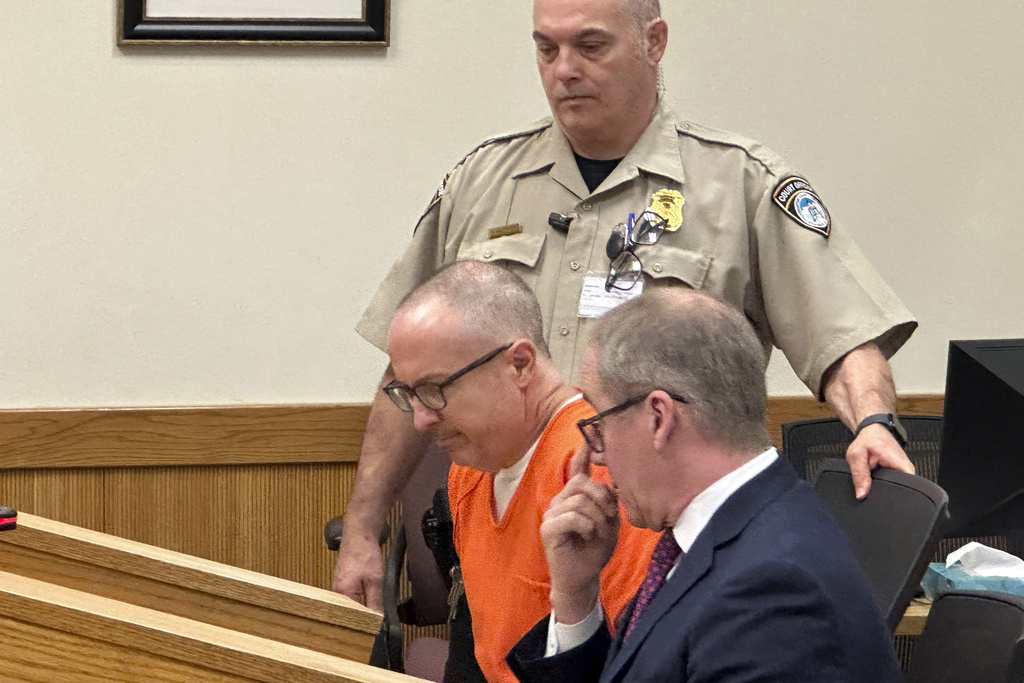UPDATE 5/10/24 5:10 p.m.
HOWELL, Mich. (AP) — A Michigan judge sentenced the former executive of a specialty pharmacy to at least 10 years in prison Friday for the deaths of 11 people who were injected with tainted pain medication, part of a meningitis outbreak that affected hundreds across the U.S. in 2012.
Barry Cadden’s sentence for involuntary manslaughter will be served at the same time as his current 14 1/2-year federal sentence for crimes tied to the outbreak. As a result, he’s not expected to spend any additional time behind bars — a deep disappointment for relatives of victims.
“This is hard because Mother’s Day is just two days away,” said Gene Keyes, whose 79-year-old mother, Sally Roe, died 30 days after getting a tainted injection.
“Barry Cadden is responsible for the disintegration of our family. Our family has been torn apart,” Keyes told Livingston County Judge Matthew McGivney.
McGivney followed a sentencing agreement negotiated by Cadden’s lawyer and the Michigan attorney general’s office. Cadden had been charged with second-degree murder but pleaded no contest to involuntary manslaughter in March.
“You have altered the lives of these families and robbed them of time with their loved ones,” the judge said.
More than 700 people in 20 states were sickened with meningitis or other debilitating illnesses and at least 64 died as a result of tainted steroids shipped to pain clinics in 2012 by New England Compounding Center in Framingham, Massachusetts, according to the U.S. Centers for Disease Control and Prevention.
But Michigan has been the only state to prosecute Cadden and a senior pharmacist, Glenn Chin, for any deaths.
Compounding pharmacies make versions of medications that often aren’t available through larger drugmakers. But Cadden’s lab was a mess, investigators said, leading to the growth of mold in the manufacturing process.
“There can be no doubt that you knew the risks that you were exposing innocent patients to and you chose, even after being investigated and sanctioned, to place your bottom line over innocent lives,” McGivney said.
Cadden, 57, did not speak in court. The judge noted that a presentence officer who interviewed him in preparation for the hearing had written that Cadden showed no remorse.
In federal court in Boston in 2017, Cadden said he was sorry for the “whole range of suffering” that occurred.
“I feel like there’s no justice,” said Keyes, who wanted Cadden to serve more time in prison.
Assistant Attorney General Shawn Ryan declined to comment outside court when asked about the plea deal.
Penny Laperriere said she had to sell her home after her husband, Lyn Laperriere, 61, died.
“Barry Cadden killed my husband. ... Mr. Cadden has no idea what I went through as he forced me into being a widow. Who does that to someone on purpose? All because of his greed,” Laperriere, 67, told the judge.
Chin’s second-degree murder case still is pending. He has not reached a deal with state prosecutors and will return to court on May 17. Meanwhile, he is serving a 10 1/2-year federal sentence.
4/18/24 1:40 p.m.
HOWELL, Mich. (AP) — A Michigan judge on Thursday suddenly postponed the sentencing of a man at the center of a fatal meningitis outbreak that hit multiple states, dismaying people who were poised to speak about their grief 12 years after the tragedy.
The judge who took a no-contest plea from Barry Cadden retired in March. But the defense attorney and the prosecutor said they still expected Michael Hatty would return to impose a minimum 10-year prison sentence for involuntary manslaughter.
Instead, Judge Matthew McGivney inherited the case. He postponed the sentencing until May 10 to clear up the confusion, upsetting many people who were ready to give statements.
A woman cried outside the Livingston County courtroom, 60 miles (96.5 kilometers) northwest of Detroit.
Peggy Nuerenberg, whose 88-year-old mother, Mary Plettl, died after getting a tainted steroid injection for pain, said she was “absolutely blindsided.”
“How things developed today were disrespectful to the victims who worked hard to prepare statements on behalf of their loved one,” Nuerenberg told The Associated Press.
Another knotty issue: McGivney’s wife works for the state attorney general’s office, which is prosecuting Cadden.
“I’m not inclined to disqualify myself,” the judge said.
4/17/24 1:30 p.m.
HOWELL, Mich. (AP) — Days after a routine injection to ease back pain, Donna Kruzich and a friend drove across the border to Canada in 2012 to see end-of-summer theater in Stratford, Ontario.
The 78-year-old Michigan woman suddenly became ill and returned home. By early October, she was dead.
“Most of the time she could not communicate with us. She was basically in a coma,” son Michael Kruzich recalled. “We knew she had meningitis — but we didn’t know how she got it.”
Evidence soon emerged: Donna Kruzich was one of at least 64 people in the U.S. who died because of tainted steroids made by a specialty pharmacy in Massachusetts. Nearly 12 years later, the operator of New England Compounding Center is returning to a Michigan court Thursday for his sentence for involuntary manslaughter.
Barry Cadden already is serving a 14 1/2-year sentence for federal crimes related to the extraordinary outbreak of fungal infections, which was traced to dirty conditions inside the lab and caused meningitis and other debilitating illnesses. More than 700 people in 20 states were sickened, according to the U.S. Centers for Disease Control and Prevention.
Michigan is the only state that charged Cadden and a key employee, pharmacist Glenn Chin, in any deaths.
Cadden, 57, recently pleaded no contest to 11 counts of involuntary manslaughter in a deal that took second-degree murder charges off the table. Prosecutors also agreed to a minimum prison term of 10 years, which will run at the same time as the federal sentence.
That means he is unlikely to face additional time in custody, an outcome that disappoints Michael Kruzich.
“My mother is gone, and Cadden and Chin are responsible. My family would like to see Cadden go to trial. It feels like they’ve run out the clock and they just want it to be done,” he said, referring to state prosecutors.
Attorney General Dana Nessel said most of the 11 families supported the plea agreement.
“We’ve ensured that this plea fits their desire for closure and justice,” she said in a written statement on March 5.
Cadden’s attorney, Gerald Gleeson II, declined to comment ahead of the sentencing. In federal court in Boston in 2017, Cadden said he was sorry for the “whole range of suffering” that occurred.
Chin has not reached a similar plea deal, court filings show, and his trial on 11 second-degree murder charges is pending in the same Livingston County court, 60 miles (96.5 kilometers) northwest of Detroit. Separately, he is serving a 10 1/2-year federal sentence.
New England Compounding Center in Framingham, Massachusetts, operated in a little-known but vital corner of the U.S. health care system. Compounding pharmacies make versions of medications that often aren’t available through larger drugmakers.
Children, for example, might need a customized dose that is different than what’s common for adults.
“They’re very important,” said Eric Kastango, a pharmacist and industry expert who testified for prosecutors in Cadden’s federal trial. “I don’t think the general public is necessarily aware what pharmacists do. They know they go into a hospital and they might need an IV. They might not know who made it or how they made it.”
In 2012, New England Compounding was shipping pain-relieving steroids to doctors across the U.S., including a clinic in Brighton, Michigan, where Donna Kruzich and others received treatment. But the lab was a mess, leading to the growth of mold in the manufacturing process.
“The environment quickly spiraled out of control,” Michigan prosecutors said in a court filing last June.
Investigators “uncovered a company placing profits over human lives. Barry Cadden was the ‘big boss’ at NECC who made many of the company’s important decisions,” the state said. “He cut corners on safety.”
Crime victims can speak in court in Michigan. Michael Kruzich, 70, said he doesn’t plan to attend Thursday, although he submitted a poem on his family’s behalf.
He told The Associated Press that his mother was a “healthy, happy woman” who loved to travel and was treasurer of her golf league in the Ann Arbor area.
“I was told 12 years ago, that you cannot harm someone more than killing them,” Kruzich said in his poem. “I’ve come to disagree — you can harm them more, when justice fails them.”



